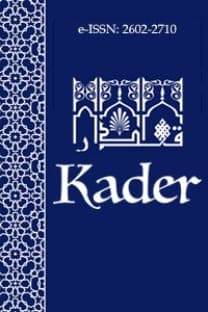Rudolf Bultmann'ın Mitolojiden Arındırma Projesi ve Vahiy İle İlişkisi
-
___
- A- Bultmann’ın Eserleri Existence and Faith: Shorter Writings of Rudolf Bultmann, S. Ogden (ed.), (London: Hodder & Stoughton, 1961.)
- Faith and Understanding I, trans.L. P. Smith,( Philadelphia: Fortress Press, 1987.)
- Jesus Christ and Mythology, (New York: Scribner, 1958.)
- New Testament and Mythology and Other Basic Writings, S. Ogden (ed.), (London: SCM, 1985.)
- B- Bultmann Üzerine Yapılmış Özel Çalışmalar Charles W. Kegley,The Theology of Rudolf Bultmann, (London: SCM Press, 1966).
- Hans Barstch (ed.), Kerygma and Myth: A Theological Debate, (London: S. P. C. K. 1953).
- Ian Henderson, “Rudolf Bultmann,“ çev. Mehmet Dağ. AÜİFD, Ankara: AÜİF yayınları, (1987), c: 29.
- İsmail Taşpınar, Rudolf Bultmann’ın Dinler Tarihi Çalışmalarına Katkısı, Basılmamış Yüksek Lisans Tezi, (Marmara Üniversitesi, İstanbul: 1997).
- John Macquarrie, An Existentialist Theology: A Comparison of Heidegger and Bultmann, (London: SCM Press, 1955). C- Diğer Eserler
- Alan W. Watts, Myth and Rıtual in Christianity, (Boston: Beacon Press, 1968).
- Ana Britannicca, c. 5 ve 16. Encyclopedia Britannicca, Inc, 1987, 15. Basım.
- Ahmet Demirhan, Heidegger ve Teoloji, (İstanbul: İnsan Yayınları, 2002).
- Alister E. McGrath, Christian Theology, (Oxford: Blackwell Publishers, 1994), 2. Basım.
- Dallas M. High, Language, Persons and Belief, Studies in Wittgenstein’s Philosophical Investigations and Religious Uses of Language,(New York: Oxford University Press, 1967).
- David West, Kıta Avrupası Felsefesine Giriş, çev. Ahmet Cevizci, (İstanbul: Paradigma Yayınları, 1998).
- Defter dergisi, Sayı: 43, (Yıl: 14), İstanbul: Metis Yayınları, 2001.
- Dictionary of Modern Western Theology, 1999, http// www. bu.edu/wwildman/
- WeirdWildWeb/ courses…/ mwt_themes_760_bultmann.ht Doğan Özlem, Tarih Felsefesi, İstanbul: Anahtar Kitaplar Yayınları, 1996, 2. Baskı.
- Edward Said, Oryantalizm, çev. Selahattin Ayaz, (İstanbul: Pınar Yayınları, 1989), Baskı.
- John Macquarrie, Twentieth Century Religious Thought, (London: SCM Press, ), Second Impression Karl Rahner, Encyclopedia of Theology, The Concise Sacramentum Mundi, (New York: Crossroad, 1986).
- Leonard Ehrlich, Karl Jaspers: Philosophy as Faith, (Amherst:The University of Massachuetts Press, 1975).
- Martin Heidegger, Zaman ve Varlık Üzerine, çev. Deniz Kanıt, (Ankara: A Yayınları, 2001).
- Mircea Eliade, Mitlerin Özellikleri, çev. Sema Rifat. (İstanbul:Simavi Yayınları, ). Paul Tillich, A History of Christian Thought, (New York: Touchstone Book, 1968).
- Winston D. Persaud, The Theology of Cross and Marx’s Antropology, (New York. Peter Lang, 1991).
- Yayın Aralığı: 2
- Başlangıç: 2003
- Yayıncı: Mehmet BULĞEN
"ESASÜ'T-TAKDİS"İN ÇEVİRİSİ ÜZERİNE -Eleştirel Bir Yaklaşım-
Kur'an'daki 'Furkân' Kavramına Dair Farklı Bir Yaklaşım
MATURİDİ'NİN KUR'AN YORUM YÖNTEMİ
Rudolf Bultmann'ın Mitolojiden Arındırma Projesi ve Vahiy İle İlişkisi
"ESASÜ'T-TAKDİS"İN ÇEVİRİSİ ÜZERİNE -Eleştirel Bir Yaklaşım-
Mehmet Akif Ersoy'un Uygarlık İmgesi: Doğu'nun ve Batı'nı Eleştirisinden "Medeniyet-i Fazıla'ya
